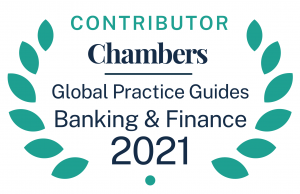 First published in Chambers Banking & Finance 2021 Global Practice Guide, the definitive global law guide offering comparative analysis from top ranked lawyers. The guide provides comprehensive coverage of loan markets, tax considerations, guarantees and security, enforcement and project finance. The guide also highlights key centres for Islamic finance.
First published in Chambers Banking & Finance 2021 Global Practice Guide, the definitive global law guide offering comparative analysis from top ranked lawyers. The guide provides comprehensive coverage of loan markets, tax considerations, guarantees and security, enforcement and project finance. The guide also highlights key centres for Islamic finance.
Cains’ Banking and Finance experts, Tim Shepherd, Peter Clucas, Stephanie Chew and Steven Quayle provide legal commentary and analysis on the key developments and trends in banking and finance in the Isle of Man.
Below is an excerpt of the Chapter prepared by Cains.
To view the full e-Edition of the 2021 Banking & Finance guide published by Chambers and Partners click here, and to download the Isle of Man Chapter click here.
Loan Market Panorama
Impact of Regulatory Environment and Economic Cycles
Whilst the Manx economy is not immune to global economic cycles, in recent years it has performed better than a number of the world’s largest economies in terms of GDP growth (including many of those in the G7). GDP in the Island increased by 3.2% during the 2018/2019 financial year (which is the latest figure currently available), although recent events outside the Island’s control, as highlighted below will have affected the Island’s GDP adversely since 2019. Sectors such as IT, e-gaming and financial services have been significant drivers to such domestic economic growth, and are likely to remain so for the foreseeable future.
However, the Isle of Man has been faced with many of the same challenges and uncertainties that have been adversely affecting the performance of the UK economy (which is its largest trading partner) and other advanced economies. These include, dealing with the consequences of Brexit and, of course, dealing with the impact and consequences of the COVID-19 pandemic, increasing political uncertainty in the UK and slowing global growth. Spending by the Isle of Man government and other initiatives aimed at boosting local investment and enterprise (such as measures designed to ameliorate the effects of the COVID-19 lockdowns on individuals and businesses and providing incentives to hi-tech companies and financial institutions to locate on the Island) have helped to counteract such wider headwinds, maintain a measure of economic growth and protect local employment opportunities.
The Isle of Man and the EU
The Isle of Man is not and has never been a member state or an associate member of the European Union (EU), and consequently the Isle of Man does not and has never made any financial contribution to the EU. From 1 January 2021 the UK departed from the EU. Prior to this date the Island enjoyed free access to EU markets for goods and products by virtue of Protocol 3 the UK Treaty of Accession. Currently Isle of Man businesses wishing to trade with the EU have to surmount the same additional hurdles as UK-based businesses. With regard to VAT, although the Isle of Man and the UK form a common VAT area, since 1 January 2021 the UK and the Isle of Man have been outside the EU common VAT area and so the effect of EU rules mean that trade between the UK/Isle of Man common VAT area and the EU common VAT area is subject to VAT.The Isle of Man and the UK
The Isle of Man continues to be served by all of the main UK clearing banks and, in addition, has recently seen the emergence of other international banks and alternative lenders (see 1.4 Alternative Credit Providers). In 2016, the Isle of Man introduced the Alternative Banking Regime (ABR) framework to provide new banking opportunities for banking businesses on the Isle of Man.
Transactions and Compliance
The number of transactions in the Isle of Man loan market over the last year has probably not been as high as in previous years due to the impact of the COVID-19 pandemic. The International Stock Exchange (TISE) has established an Isle of Man office and seeks to attract more listings from “trading companies”. Among other things, such a listing potentially provides Isle of Man entities with access to the high-yield debt market (see 1.3 The High-Yield Market).
In keeping with many other well-regulated jurisdictions, banks in the Island face increasing compliance responsibilities, with the Isle of Man Financial Services Authority (FSA) and the Isle of Man government being fully committed to demonstrating a high degree of compliance with the applicable international standards relating to Anti-Money Laundering and Countering the Financing of Terrorism (AML/CFT) issues.
Lending
The majority of lending to Isle of Man structures is made by UK, Irish and other European banks, and by alternative lenders (particularly in respect of commercial property), so factors that affect new loan origination in such markets are of direct relevance to Manx borrowers. For example, it is common for lending by UK-based lenders to corporate borrowers in this jurisdiction to be based on Loan Market Association (LMA) form – and English law governed – loan documents.
To view the full e-Edition of the 2021 Banking & Finance guide published by Chambers and Partners click here, and to download the Isle of Man Chapter click here.